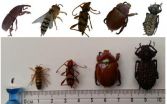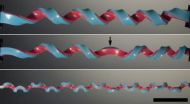(Press-News.org) A pilot study by Massachusetts General Hospital (MGH) investigators may lead to greater availability and acceptability of an unusual treatment for a serious medical problem – use of fecal material from healthy donors to treat recurrent diarrhea caused by the Clostridium difficile (C. difficile) bacteria. In their paper being published online in the journal Clinical Infectious Diseases, the researchers report that use of prescreened frozen fecal material from donors unrelated to patients was as successful in curing recurrent C. difficile infection as was the use of fresh material reported in previous studies of what is called Fecal Microbiota Transplant (FMT).
"We found that delivery of a frozen, stored inoculum through a nasogastric tube is safe, acceptable to patients and as successful as delivery by colonoscopy – which requires a preparatory 'clean out,' sedation or anesthesia, and is quite costly," says Elizabeth Hohmann, MD, of the MGH Infectious Diseases Division, senior author of the report. "Without this treatment option, patients with recurrent C. difficile may have chronic diarrhea – limiting their quality of life and their ability to maintain weight – and need to live on chronic antibiotic treatment, which is both expensive and can have other side effects."
C. difficile infection has become an increasingly serious problem, causing around 250,000 infections requiring hospitalization and 14,000 deaths each year in the U.S. Hohmann notes that from two to five patients test positive for the infection at MGH every day. In patients with recurrent or treatment-resistant infection, long-term treatment with vancomycin or other antibiotics has had limited success, with symptoms recurring up to 30 percent of the time. In fact, antibiotic treatment has the potential of making matters worse, as it kills off the beneficial normal intestinal microbes that can keep pathologic species like C. difficile in check.
FMT probably treats C. difficile by restoring the normal balance of intestinal microbes. Previous animal and human FMT studies using fresh fecal material have had success rates of around 90 percent, but the MGH researchers note that recruiting and screening potential donors can be time-consuming and costly. Banking a supply of frozen, prescreened donor stool could significantly increase the availability of FMT, and the current study was designed to test the feasibility and effectiveness of such an approach, along with comparing two routes for delivery of the donor material.
Stool samples were donated by exceptionally healthy adults who received comprehensive screening for infectious diseases. Donors also were asked to refrain from eating any common allergens, such as nuts or eggs, in the days before donation. The donated fecal material was filtered, diluted, screened and frozen; stored for at least four weeks to allow retesting donors for any hidden infections; and prior to administration, thawed and kept refrigerated.
The study enrolled 20 patients – three of whom were children – who either had three or more episodes of mild to moderate C. difficile infection for which antibiotic treatment failed or had two episodes serious enough to require hospitalization. Participants were randomly divided into two groups – 10 who received donor material by standard colonoscopy and 10 who received it though a nasogastric tube (NGT) passed into the stomach. A single administration was successful in curing 14 of the 20 participants – 8 in the colonoscopy group and 6 in the NGT group, a difference not considered significant in such a small study.
Among those whose infections did not resolve, a single participant declined additional treatment. The other 5 received a second administration, which cured the infection in 4, for an overall success rate of 90 percent, similar to that of the previous studies. Participants who received the second infusion were allowed to choose the route of administration, and all chose to receive it via NGT.
Subsequently the researchers discovered that the participant who declined a second infusion was self-administering fecal enemas, using unprocessed material from his roommate, a practice Hohmann notes could be hazardous. "We certainly don't recommend 'home brew' FMT, since it's very important to screen donors properly. In addition, while some people may be comfortable using stool from a spouse or other intimate partner, many older patients might not have such a donor who is healthy enough to donate safely."
The research team also reports treating an additional 11 patients with frozen donor samples via NGT, achieving a 91 percent success rate, and they currently are investigating what may be an even more acceptable means of administration – via a capsule that would remain undigested until it reaches the small intestine.
"It's been very gratifying to be able to help these patients, some of whom have been sick for a year or two," Hohmann explains. "They have told us this has been life changing for them and that they have gotten themselves back to normal. There aren't many things in medicine that have a success rate of more than 90 percent. Insurers may not want to pay for this, but it is very effective, makes patients better quite quickly and saves money overall. While it may never become a first-line treatment, we are starting to consider using it more and more often," she adds.
INFORMATION:
Hohmann is an associate professor of Medicine at Harvard Medical School. The lead and corresponding author of the Clinical Infectious Diseases paper is Ilan Youngster, MD, of the Infectious Diseases Divisions at MGH and at Boston Children's Hospital. Additional co-authors are Jenny Sauk, MD, and Robin Wilson, MGH Gastroenterology; Christina Pindar, MGH Infectious Diseases; Jess Kaplan, MD, and George Russell, MD, Pediatric Gastroenterology and Nutrition, MassGeneral Hospital for Children; Mark Smith and Eric Alm, PhD, Massachusetts Institute of Technology; and Dirk Gevers, PhD, Broad Institute. Support for the study includes National Institute for Allergy and Infectious Diseases contract HHSN272200900018C.
Massachusetts General Hospital, founded in 1811, is the original and largest teaching hospital of Harvard Medical School. The MGH conducts the largest hospital-based research program in the United States, with an annual research budget of more than $775 million and major research centers in AIDS, cardiovascular research, cancer, computational and integrative biology, cutaneous biology, human genetics, medical imaging, neurodegenerative disorders, regenerative medicine, reproductive biology, systems biology, transplantation biology and photomedicine.
Use of frozen material for fecal transplant successfully treats C. difficile infection
Mass. General study identifies more acceptable way to administer treatment for dangerous recurrent infection
2014-04-24
ELSE PRESS RELEASES FROM THIS DATE:
Pilot study suggests ways to widen access to fecal transplants for C. diff infections
2014-04-24
Using frozen stool from healthy, unrelated donors was safe and effective in treating patients with serious, relapsing diarrhea caused by Clostridium difficile, according to a new pilot study published in Clinical Infectious Diseases and available online. Known as fecal microbiota transplantation, the treatment was equally effective whether given via a colonoscope or a nasogastric tube. The findings suggest approaches that may make this promising treatment more readily available to patients.
A growing concern, C. difficile causes 250,000 infections requiring hospitalization ...
Pregnancy complications may be more common in immigrants from certain regions
2014-04-24
TORONTO, April 24, 2014 – Pregnant immigrants from Sub-Saharan Africa, Latin America and Caribbean islands may require increased monitoring during pregnancy, according to new research from St. Michael's Hospital.
The study, published today in the British Journal of Obstetrics and Gynaecology, assessed the differences in preeclampsia and eclampsia rates among immigrants and native-born women in six high-immigration countries – Australia (Victoria), Canada (Ontario), Denmark, Sweden, Spain (Catalonia and Valencia) and the United States (California, New Jersey and New York ...
Moffitt Cancer Center's phase 3 study may be game-changer for acute myeloid leukemia
2014-04-24
Moffitt Cancer Center researchers say clinical trials for a new experimental drug to treat acute myeloid leukemia (AML) are very promising. Patients treated with CPX-351, a combination of the chemotherapeutic drugs cytarabine and daunorubicin, are showing better responses than patients treated with the standard drug formulation.
"Acute myeloid leukemia is an aggressive blood cancer with very low rates of treatment success, especially in older patients," explained Jeffrey Lancet, M.D., senior member of the Department of Malignant Hematology and chief of the Leukemia ...
It's a bubble, but not as we know it
2014-04-24
Multi-sensory technology that creates soap bubbles, which can have images projected onto them or when the bubbles are burst release a scent, will be unveiled at an international conference later this month.
The research paper, to be presented at one of the world's most important conferences on human-computer interfaces - ACM CHI 2014 [26 April-1 May], could be used in areas such as gaming or education and encourage a new way of thinking about multi-sensory technologies.
SensaBubble, led by Professor Sriram Subramanian from the University of Bristol's Department of ...
The Lancet Global Health: Recurrent violence linked to substantially higher rates of mental disorders in post-conflict communities
2014-04-24
In the aftermath of war, communities who continue to experience repeated violence could have a major escalation in rates of post-traumatic stress disorder (PTSD) and severe distress, suggests new research published in The Lancet Global Health journal.
In 2004, Dr Derrick Silove from the University of New South Wales in Sydney, Australia, and colleagues conducted a survey to estimate the prevalence of common mental disorders among 1022 adults (600 from a rural village and 422 from an urban district) in Timor Leste four years after the end of a long-running and violent ...
The Lancet Diabetes & Endocrinology: Vitamin D supplements have little effect on risk of falls in older people
2014-04-24
A new meta-analysis, published in The Lancet Diabetes & Endocrinology journal, concludes that there is no evidence to suggest that vitamin D supplements prevent falls, and that ongoing trials to test this theory are unlikely to change this result.
The study, by Dr Mark Bolland of the University of Auckland, New Zealand, and colleagues, analysed findings from 20 randomised controlled trials which tested the potential of vitamin D supplements to reduce falls, in a total of 29535 people. The findings show that supplements do not reduce falls by 15% or more, meaning that the ...
Citizen scientists match research tool when counting sharks
2014-04-24
Shark data collected by citizen scientists may be as reliable as data collected using automated tools, according to results published April 23, 2014, in the open access journal PLOS ONE by Gabriel Vianna from The University of Western Australia and colleagues.
Shark populations are declining globally, and scientists lack data to estimate the conservation status of populations for many shark species. Citizen science may be a useful and cost-effective means to increase knowledge of shark populations on coral reefs, but scientists do not yet know enough about how data collected ...
'Off-the-shelf' equipment used to digitize insects in 3-D
2014-04-24
Scientists have developed a cost-effective, off-the-shelf system to obtain natural-color 3D models of insects, according to results published April 23, 2014, in the open access journal PLOS ONE by Chuong Nguyen from CSIRO in Australia, and colleagues.
Scientists studying insects rely on collected specimens that are often shared between scientists through written descriptions, diagrams, and images. These 2D tools are important in understanding and sharing specimens, but they often lack the precise detail of the actual 3D specimen. The authors of this study, interested in ...
Stem cells in circulating blood affect cardiovascular health, study finds
2014-04-24
COLUMBUS, Ohio – New research suggests that attempts to isolate an elusive adult stem cell from blood to understand and potentially improve cardiovascular health – a task considered possible but very difficult – might not be necessary.
Instead, scientists have found that multiple types of cells with primitive characteristics circulating in the blood appear to provide the same benefits expected from a stem cell, including the endothelial progenitor cell that is the subject of hot pursuit.
"There are people who still dream that the prototypical progenitors for several ...
Scientists discover a new shape using rubber bands
2014-04-24
Cambridge, Mass. – April 23, 2014 – While setting out to fabricate new springs to support a cephalopod-inspired imaging project, a group of Harvard researchers stumbled upon a surprising discovery: the hemihelix, a shape rarely seen in nature.
This made the researchers wonder: Were the three-dimensional structures they observed randomly occurring, or are there specific factors that control their formation? The scientists answered that question by performing experiments in which they stretched, joined, and then released rubber strips. Complemented by numerical simulations ...
LAST 30 PRESS RELEASES:
$3 million NIH grant funds national study of Medicare Advantage’s benefit expansion into social supports
Amplified Sciences achieves CAP accreditation for cutting-edge diagnostic lab
Fred Hutch announces 12 recipients of the annual Harold M. Weintraub Graduate Student Award
Native forest litter helps rebuild soil life in post-mining landscapes
Mountain soils in arid regions may emit more greenhouse gas as climate shifts, new study finds
Pairing biochar with other soil amendments could unlock stronger gains in soil health
Why do we get a skip in our step when we’re happy? Thank dopamine
UC Irvine scientists uncover cellular mechanism behind muscle repair
Platform to map living brain noninvasively takes next big step
Stress-testing the Cascadia Subduction Zone reveals variability that could impact how earthquakes spread
We may be underestimating the true carbon cost of northern wildfires
Blood test predicts which bladder cancer patients may safely skip surgery
Kennesaw State's Vijay Anand honored as National Academy of Inventors Senior Member
Recovery from whaling reveals the role of age in Humpback reproduction
Can the canny tick help prevent disease like MS and cancer?
Newcomer children show lower rates of emergency department use for non‑urgent conditions, study finds
Cognitive and neuropsychiatric function in former American football players
From trash to climate tech: rubber gloves find new life as carbon capturers materials
A step towards needed treatments for hantaviruses in new molecular map
Boys are more motivated, while girls are more compassionate?
Study identifies opposing roles for IL6 and IL6R in long-term mortality
AI accurately spots medical disorder from privacy-conscious hand images
Transient Pauli blocking for broadband ultrafast optical switching
Political polarization can spur CO2 emissions, stymie climate action
Researchers develop new strategy for improving inverted perovskite solar cells
Yes! The role of YAP and CTGF as potential therapeutic targets for preventing severe liver disease
Pancreatic cancer may begin hiding from the immune system earlier than we thought
Robotic wing inspired by nature delivers leap in underwater stability
A clinical reveals that aniridia causes a progressive loss of corneal sensitivity
Fossil amber reveals the secret lives of Cretaceous ants
[Press-News.org] Use of frozen material for fecal transplant successfully treats C. difficile infectionMass. General study identifies more acceptable way to administer treatment for dangerous recurrent infection


